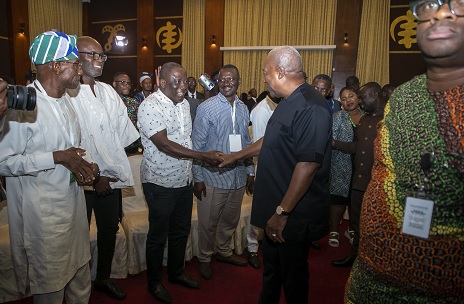President John Dramani Mahama has reiterated his commitment to leave office after the end of his tenure in 2028.
“Certainly, I’m not on the way to becoming a supreme leader or an autocrat,” Mr Mahama stressed.
He gave the assurance that he would not push for constitutional amendments that would allow him to run for a third term as President.
Addressing a Presidential Media Encounter at the Jubilee House last Wednesday, Mr Mahama stressed his commitment to constitutional democracy as he was a democrat through and through.
“And even when we attained two-thirds of Parliament, I said that we are not going to use it to ride roughshod over the minority and that we are going to give opportunity for democracy to flourish. And so we know we intend to use that two-thirds majority to steamroll our democracy," he stated.
Context
The 1992 Constitution restricts Presidents to a maximum of two four-year terms, but there have been suggestions that he intended to use the two-thirds majority of the National Democratic Congress (NDC) in Parliament to amend the Constitution to enable him to seek an extension of his presidential term limit to three terms.
The recent removal of Chief Justice Gertrude Araba Esaaba Sackey Torkornoo, combined with the NDC’s super majority in Parliament, has been interpreted as part of a plot to consolidate authoritarian power.
Justice Torkornoo was removed from office on Monday, September 1, 2025, in accordance with Article 146(9) of the 1992 Constitution. According to the Presidency, the decision followed a recommendation by a committee set up under Article 146(6) to investigate a petition filed by a citizen, Mr Daniel Ofori. Her dismissal took immediate effect.
Concerns have also been raised that the NDC’s super majority in Parliament could be used to push through constitutional amendments that entrench executive dominance, including a possible third term for the President.
Institutions
President Mahama said attempts to weaken institutions for political gain undermined Ghana’s democratic progress.
He, therefore, rejected such claims, insisting he remained fully committed to democratic governance.
He pointed out that the removal of the Chief Justice was carried out strictly in line with constitutional provisions.
24-Hour Authority
President Mahama also announced that the Cabinet had approved the 24-Hour Authority Bill for onward submission to Parliament.
He said some key institutions had taken the lead in actualising the 24-Hour Economy Vision, citing the Ghana Publishing Company, which had transitioned to a whole 24-Hour operation.
He said the Passport Office and Ghana’s foreign missions had also rolled out round-the-clock services to expedite passport processing and improve service delivery.
President Mahama noted that the Tema and Takoradi ports were now operating 24 hours to boost trade efficiency and reduce congestion.
To guarantee safety within the evolving ecosystem, he said a dedicated 24-Hour Economy Policy Secretariat had been established in the Ministry of Interior to provide continuous security support across the country.
Those bold steps, he said, signalled an explicit national commitment to building a resilient, inclusive and job-rich economy.

